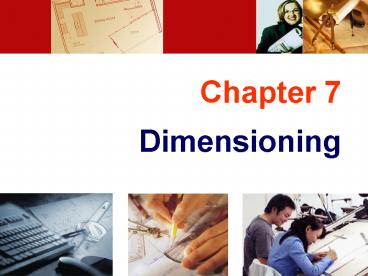Dimensioning - PowerPoint PPT Presentation
1 / 59
Title:
Dimensioning
Description:
CHAMFER. Use leader line and note to indicate linear. distance and angle of the chamfer. ... For a 45o chamfer. S S. CS. or. ROUNDED-END SHAPES. R12. f 12. 21. 5 ... – PowerPoint PPT presentation
Number of Views:35
Avg rating:3.0/5.0
Title: Dimensioning
1
Chapter 7 Dimensioning
2
TOPICS
3
Introduction
4
ENGINEERING DESIGN
TRANSFERRED INFORMATION
RESULT
PROCESS
Design a part
Create drawings
1. Size, Location
Dimensioning
2. Non-graphic information
Manufacture
5
DEFINITION
Dimensioning is the process of specifying part
s information by using of figures, symbols and
notes.
This information are such as 1. Sizes and
locations of features 2. Materials type 3.
Number required 4. Kind of surface finish 5.
Manufacturing process 6. Size and geometric
tolerances
This course
6
DIMENSIONING SYSTEM
1. Metric system ISO and JIS standards
This course
Examples
32, 32.5, 32.55, 0.5 (not .5) etc.
2. Decimal-inch system
Examples
0.25 (not .25), 5.375 etc.
3. Fractional-inch system
,
Examples
etc.
7
DimensioningComponents
8
DIMENSIONING COMPONENTS
Drawn with 4H pencil
Lettered with 2H pencil.
9
EXTENSION LINES
indicate the location on the objects features
that are dimensioned.
10
DIMENSION LINES
indicate the direction and extent of a dimension,
and inscribe dimension figures.
10
27
13
123o
43
11
LEADER LINES
indicate details of the feature with a local
note.
10
27
10 Drill, 2 Holes
R16
13
123o
43
12
RecommendedPractices
13
EXTENSION LINES
COMMON MISTAKE
Visible gap
14
EXTENSION LINES
COMMON MISTAKE
Continuous
15
DIMENSION LINES
Leave a space at least 2 times of a letter height.
16
11
34
35
Leave a space at least 1 time of a letter height.
16
DIMENSION FIGURES
COMMON MISTAKE
11
34
17
DIMENSION FIGURES
Not enough space for figures
Not enough space for arrows
16.25
1
1
1
16.25
or
18
DIMENSION FIGURES UNITS
The JIS and ISO standards adopt the unit of
19
DIMENSION FIGURES ORIENTATION
1. Aligned method
The dimension figures are placed so that they are
readable from the bottom and right side of the
drawing.
2. Unidirectional method
The dimension figures are placed so that they can
be read from the bottom of the drawing.
Do not use both system on the same drawing or on
the same series of drawing (JIS Z8317)
20
EXAMPLE Dimension of length using aligned
method.
21
EXAMPLE Dimension of length using
unidirectional method.
22
EXAMPLE Dimension of angle using aligned method.
45o
45o
45o
45o
45o
45o
45o
45o
23
EXAMPLE Dimension of angle using unidirectional
method.
24
LOCAL NOTES
COMMON MISTAKE
10 Drill
Too far
25
DimensioningPractices
26
THE BASIC CONCEPT
Dimensioning is accomplished by adding size and
location information necessary to manufacture the
object.
This information have to be
27
EXAMPLE
Designed part
To manufacture this part we need to know
1. Width, depth and thickness of the part.
2. Diameter and depth of the hole.
S denotes size dimension. L denotes location
dimension.
3. Location of the holes.
28
ANGLE
COMMON MISTAKE
29
ARC
R 200
R 200
or
30
ARC
Sufficient space for both.
Sufficient space for arrowhead only.
Insufficient space for both.
Move figure outside
Move both figure and arrow outside
R 62.5
R 200
R 6.5
R 58.5
31
ARC
COMMON MISTAKE
60o
R62.5
30o
32
ARC
Method 1
Method 2
33
FILLETS AND ROUNDS
NOTE All fillets and round are R6.5
NOTE All fillets and round are R6.5
unless otherwise specified.
34
CURVE
COMMON MISTAKE
35
CYLINDER
Measurement method
36
CYLINDER
37
HOLES
Measurement method
38
HOLES SMALL SIZE
1) Through thickness hole
or
or
or
39
HOLES SMALL SIZE
2) Blind hole
or
40
HOLES LARGE SIZE
Use leader line and note
Use diametral dimension line
Use extension and dimension lines
41
HOLES
COMMON MISTAKE
42
CHAMFER
For a 45o chamfer
or
43
ROUNDED-END SHAPES
Center to Center Distance
R12
44
ROUNDED-END SHAPES
R12
Center to Center Distance
45
ROUNDED-END SHAPES
R12
46
ROUNDED-END SHAPES
R12
Tool cutting distance
47
ROUNDED-END SHAPES
48
ROUNDED-END SHAPES
49
Placement ofDimensions
50
RECOMMENDED PRACTICE
POOR
GOOD
51
RECOMMENDED PRACTICE
POOR
GOOD
52
RECOMMENDED PRACTICE
WRONG
CORRECT
53
RECOMMENDED PRACTICE
POOR
GOOD
54
RECOMMENDED PRACTICE
POOR
GOOD
55
RECOMMENDED PRACTICE
POOR
GOOD
56
RECOMMENDED PRACTICE
BETTER
JUST OK !!!
57
RECOMMENDED PRACTICE
POOR
GOOD
58
RECOMMENDED PRACTICE
POOR
GOOD
59
RECOMMENDED PRACTICE
POOR
GOOD






















![⚡[PDF]✔ Public Places Urban Spaces: The Dimensions of Urban Design PowerPoint PPT Presentation](https://s3.amazonaws.com/images.powershow.com/10047357.th0.jpg?_=20240604105)








